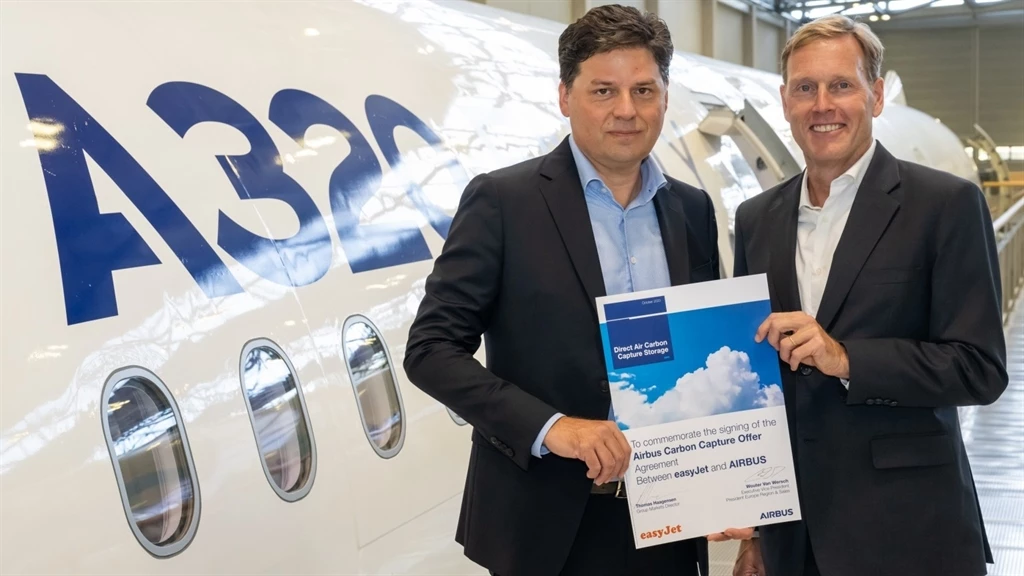London, UK, 2023-Oct-10 — /Travel PR News/ — easyJet has become the first airline in the world to sign a contract with Airbus for its carbon-removal initiative. Available through the Airbus Carbon Capture Offer, the technology uses Direct Air Carbon Capture and Storage (DACCS), to offer airlines worldwide carbon removal credits to advance their decarbonisation goals.
DACCS technology filters and removes CO2 emissions directly from the air using high powered extraction fans. Once removed from the air, the CO2 is safely and permanently stored in underground reservoirs. CO2 emissions released into the atmosphere during aircraft operations cannot be directly eliminated at source but with DACCS, an equivalent amount can be extracted from the air. The technology is complementary to other carbon reduction technologies such as the use of Sustainable Aviation Fuel (SAF).
Thomas Haagensen, Group Markets Director at easyJet, said: “Decarbonising a hard to abate sector, such as aviation, is a huge challenge and we believe carbon removal will play an important role in addressing our residual emissions in the future, complementing other components to help us achieve our pathway to net zero. Our ultimate aim is to achieve zero carbon emission flying and, as well as investing into important projects like direct air carbon capture technology, we are working with multiple partners – including Airbus – to accelerate the development of zero carbon emission aircraft technology.”
Julie Kitcher, Executive Vice President Communications, Sustainability & Corporate Affairs at Airbus, said: “easyJet is a strong advocate of decarbonisation, for its operations and the wider aviation sector. This agreement demonstrates the airline’s willingness to extend its environmental commitment through Airbus’ Carbon Capture Offer. Initiatives such as this one underline Airbus’ commitment to decarbonisation solutions for our industry and to, bringing together airlines and industry players from all sectors in order to build a sustainable aviation ecosystem.”
easyJet was amongst the first airlines to sign an agreement with Airbus in 2022, commiting to engage in negotiations on the possible pre-purchase of verified and durable carbon removal credits. easyJet’s credits will last from 2026 to 2029. The carbon removal credits will be issued by Airbus’ partner 1PointFive. Airbus’ agreement with 1PointFive includes the pre-purchase of 400,000 tonnes of carbon removal credits to be delivered over four years.
To know more about Airbus’ Carbon Capture Offer and DACCS, visit our website.
About easyJet
easyJet is Europe’s leading airline offering a unique and winning combination of the best route network connecting Europe’s primary airports, with great value fares and friendly service.
easyJet flies on more of Europe’s most popular routes than any other airline and carried more than 69 million passengers in 2022 – with 9.5 million travelling for business. The airline has over 300 aircraft on nearly 1000 routes to more than 150 airports across 35 countries. Over 300 million Europeans live within one hour’s drive of an easyJet airport.
easyJet aims to be a good corporate citizen, employing people on local contracts in eight countries across Europe in full compliance with national laws and recognising their trade unions. The airline supports several local charities and has a corporate partnership with UNICEF which has raised over £16m for the most vulnerable children since it was established in 2012.
The airline joined the UN-backed Race to Zero in November 2021 and has published its roadmap to net zero carbon emissions by 2050, with a focus on new technology and the ultimate ambition to achieve zero carbon emission flying across its entire fleet, which the airline is working on together with its partners including Airbus, Rolls-Royce, GKN Aerospace, and Cranfield Aerospace Solutions. The roadmap also features a combination of fleet renewal, operational efficiencies, airspace modernisation, Sustainable Aviation Fuel and carbon removal technology. Additionally, it includes an interim carbon emissions intensity reduction target of 35% by 2035 (versus 2019). Since 2000, the airline has already reduced its carbon emissions per passenger, per kilometre by one-third through continued fleet renewal, efficient operations and aiming to fill most of its seats.
Innovation is in easyJet’s DNA – since launching over 25 years ago, easyJet changed the way people fly to the present day where the airline leads the industry in digital, web, engineering and operational innovations to make travel more easy and affordable for its passengers.
Media Contact:
matt.clemens@easyjet.com
Source: easyJet
###

